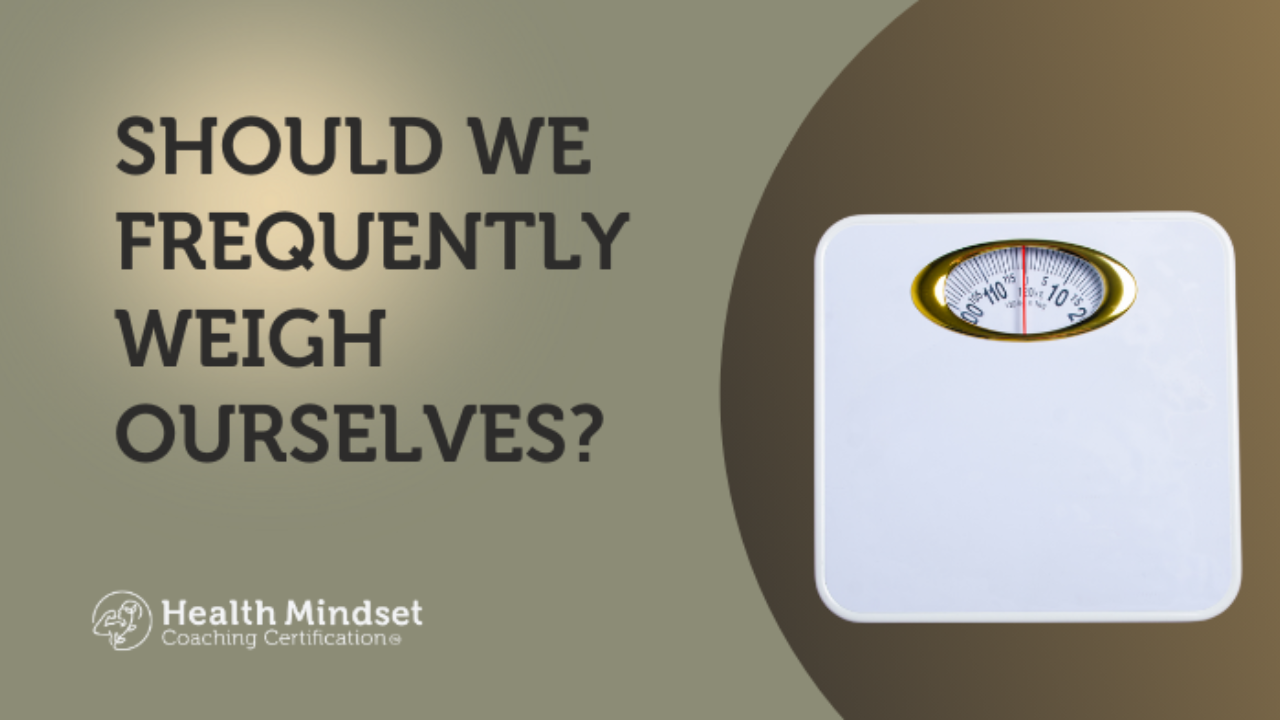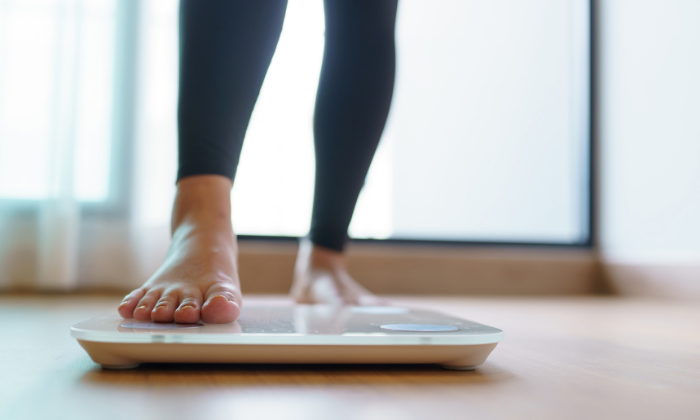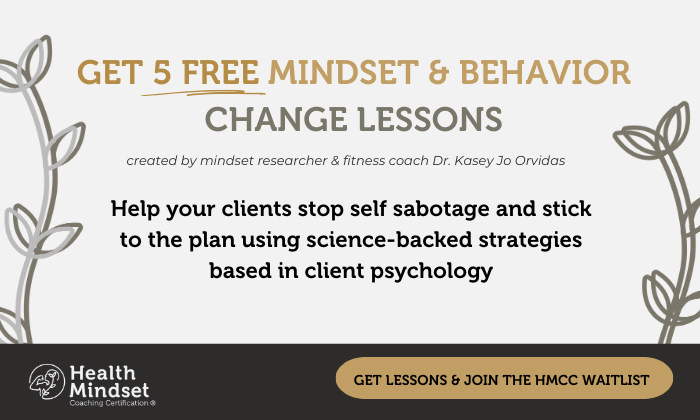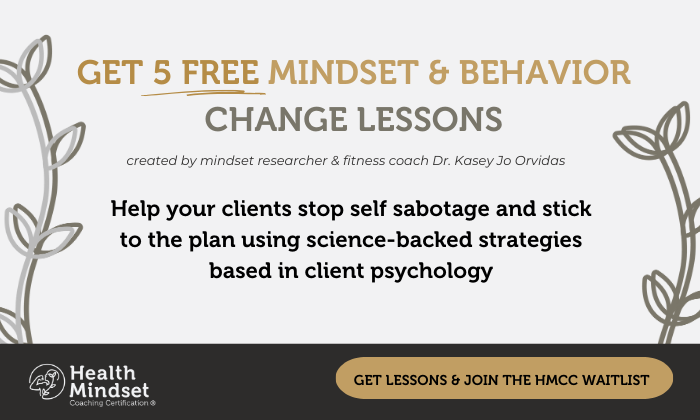Is Daily Weighing a Good Idea? The Psychological Impact Considerations for Fitness Coaches
Jun 13, 2025
This blog post might get a bit of heat because there is a lot of negativity around weighing yourself in general and even more so around daily weighing.
What I want to address is whether it's a good or bad thing for you (or your clients) to weigh yourself every day by looking at it from a psychological perspective.
As a mindset expert with a PhD in psychology, I have thoughts around this that are grounded in research as well as personal and client experience.
If you've ever wondered whether you should weigh yourself every day, or if you coach clients who are struggling with scale anxiety, this post will help you navigate the mental health effects of daily weigh-ins and what the research actually says.
Table of Contents
Increase the Chances of Weight Loss Success
Two Psychological Perspectives on Daily Weighing
What Researchers Found
Individual Considerations with Weight Management and Self-Monitoring
What This Means for Coaches
Assess Your Clients' Readiness and Emotional Resilience
Reframe the Scale as a Data Point
Incorporating Mindset Practices
Get the Mindset Tools You Need
Check Out the Podcast
Sources
Increase the Chances of Weight Loss Success
Research suggests that one key component of successfully losing weight and maintaining weight loss is self-monitoring.
Self-monitoring can include, but is not limited to:
- Tracking food portions
- Counting macros
- Logging workouts
- Tracking body weight
Monitoring body weight seems to be the one self-monitoring tool that comes with the most controversy.
If you want to lose weight, it's hard to know if what you're doing is actually working without monitoring it. But at what cost... psychologically?

Two Psychological Perspectives on Daily Weighing
It's pretty easy to imagine how someone might end up with some negative psychological effects if they start each day by facing the number on the scale, especially if they believe that number to represent more than what it actually does.
For example, you have probably had at least one client who connects the number on the scale with their self-worth. You and I know that their weight doesn't indicate whether they are a good, lovable, and worthy human being, but they might not see it that way in this moment.
On the flip side, it's also pretty easy to imagine how monitoring your body weight can be extremely beneficial for losing weight and recognizing progress, since you likely can't see or feel any progress until there has been a significant amount of weight loss.
What Researchers Found
So, what's the deal here? Are there actually any negative psychological impacts from frequent self-weighing?
How helpful is it for weight loss outcomes? And what about weight loss maintenance?
Let's look at a systematic literature review of 17 studies from Zheng et al. (2015). All of the studies researchers reviewed focused on the impact of self-weighing.
Researchers found that all studies reported that more frequent self-weighing was associated with greater weight loss, less weight regain, and better weight gain prevention.
And what are we considering as frequent self-weighing?
Five of the studies reviewed reported that daily weighing was associated with better overall outcomes.
Two of them demonstrated that weekly weighing was associated with better weight loss and weight maintenance.
One study showed that participants lost more weight with daily and weekly weighing than with monthly weighing.
Another study reported no differences between weekly weigh-ins and monthly weigh-ins.
Researchers did not find any adverse psychological effects related to frequent self-weighing.
In fact, frequent self-weighing was associated with increased dietary restraint and body satisfaction, decreased depressive symptoms, and decreased weight or body shape concerns.
The results from one study showed that daily self-weighing was perceived positively, easy to do, easy to remember, and helpful.
Overall, the research does support frequently weighing yourself, but that's assuming you are looking to lose weight, maintain weight loss, or prevent weight regain. And the psychological impact is not much of a concern.

Individual Considerations with Weight Management and Self-Monitoring
Of course, research looks at things in aggregate. In other words, we are taking the average across many people.
What this means is that some people may have negative psychological effects related to weighing themselves, and some will have a really positive psychological effect.
As a fitness coach, it's your job to ensure you have strategies in place to support your or your client's mindset in the process (like the ones we teach in the Health Mindset Coaching Certification).
For me personally, in my fitness journey, I found the more I weighed myself, the less I attached any emotion to it (call it exposure therapy)
What This Means for Coaches
As a coach, it's important to remember that what works well for one client might be detrimental to another, and daily weighing is no exception.
The research is clear that frequent self-weighing can support weight loss and weight maintenance without harming psychological well-being on average. But you're not coaching averages, you're coaching individuals.
There are a few different ways you can apply this information to support your clients' goals and mindset.
Assess Your Clients' Readiness and Emotional Resilience
Something I teach all the students in the Health Mindset Coaching Certification is the importance of asking your clients questions.
You have to evaluate your clients' current relationship with the scale before suggesting daily or even weekly weighing.
Consider things like whether they have strong emotional reactions to weight fluctuations; if they've struggled with disordered eating, body image issues, or obsessive behaviors in the past; and if they can see the number on the scale as a piece of data rather than a measure of their self-worth.
If they say no to any of those questions, it may be a good idea to first work with them on improving their mindset and looking at weighing themselves down the road.
You can get 5 FREE lessons in mindset and behavior change here to help you get started with shifting your client's mindset.
Reframe the Scale as a Data Point
Reframing how your clients view their body weight and the number on the scale is where the mindset work really comes into play.
You can teach your clients that their weight is simply a data point, not a judgment. Emphasize that weight fluctuations are normal and can be influenced by factors such as:
- Water retention
- Hormonal changes
- Sleep quality
- Sodium intake
- Menstrual cycle
- Time of day
Clients may find it helpful to weigh themselves at the same time each day to get more consistent results.
The general recommendation is to weigh yourself first thing in the morning after using the bathroom and while wearing the same clothing or nothing at all.
Once your clients learn to view their weight as a data point, it will become a tool for insight rather than a trigger for guilt or shame.

Incorporating Mindset Practices
You can use self-weighing as an opportunity to build psychological flexibility with your clients. That is, their ability to be fully present in a moment while acknowledging their thoughts or emotions without judgment or avoidance, and to act in a way that aligns with their goals.
You can teach your clients to log their weight without judgment and to look for trends over time rather than day-to-day changes in weight.
It may be beneficial to your client to pair weigh-ins with affirmations, gratitude, and self-reflection. They can journal how they feel before and after stepping on the scale until they reach a point that they feel entirely neutral about it and view their weight as data.
For clients who want to reduce scale anxiety, regular exposure (like daily weighing) can actually help. Much like exposure therapy, the more often they encounter the scale without attaching meaning to the number, the less power it holds over their emotions.
However, this only works when paired with proper mindset coaching and support, like the tools we teach inside the Health Mindset Coaching Certification.
Get the Mindset Tools You Need
The Health Mindset Coaching Certification is my 14-week program for health and fitness professionals that equips you with the skills you need to help your clients end self-sabotage, break through mindset barriers, and make behavior changes for good.
You'll learn research-backed methods from Cognitive Behavioral Therapy and other psychological tools to help your clients embrace a growth mindset and create lasting behavior change.
I created the Health Coach Mindset Certification program to bridge the gap between nutrition and training science, which you were probably taught in your coaching certification, and mindset, which you likely weren't taught very much about.
I'm sharing with you what I've learned from years of coaching, researching, implementing, reading, and absolutely loving.
Join the waitlist here, and you'll get immediate access to some free primer materials to get you started!
Check Out the Podcast
If you liked this post and want to get more insights from me about the psychological impact of daily weigh-ins, the research study I mentioned, or considerations for coaches, check out this podcast episode.
In this episode, I discuss self-monitoring and the psychological impact of daily weigh-ins. I share psychological research on the impact of weighing yourself daily and the importance of developing a neutral relationship with the scale to improve your overall health and well-being.
Check out the Instagram post here.
Connect with us!
Email: [email protected]
IG: @coachkaseyjo @healthmindsetcert
Sources
Zheng, Y., Klem, M. L., Sereika, S. M., Danford, C. A., Ewing, L. J., & Burke, L. E. (2015). Self-weighing in weight management: a systematic literature review. Obesity (Silver Spring, Md.), 23(2), 256–265. https://doi.org/10.1002/oby.20946






